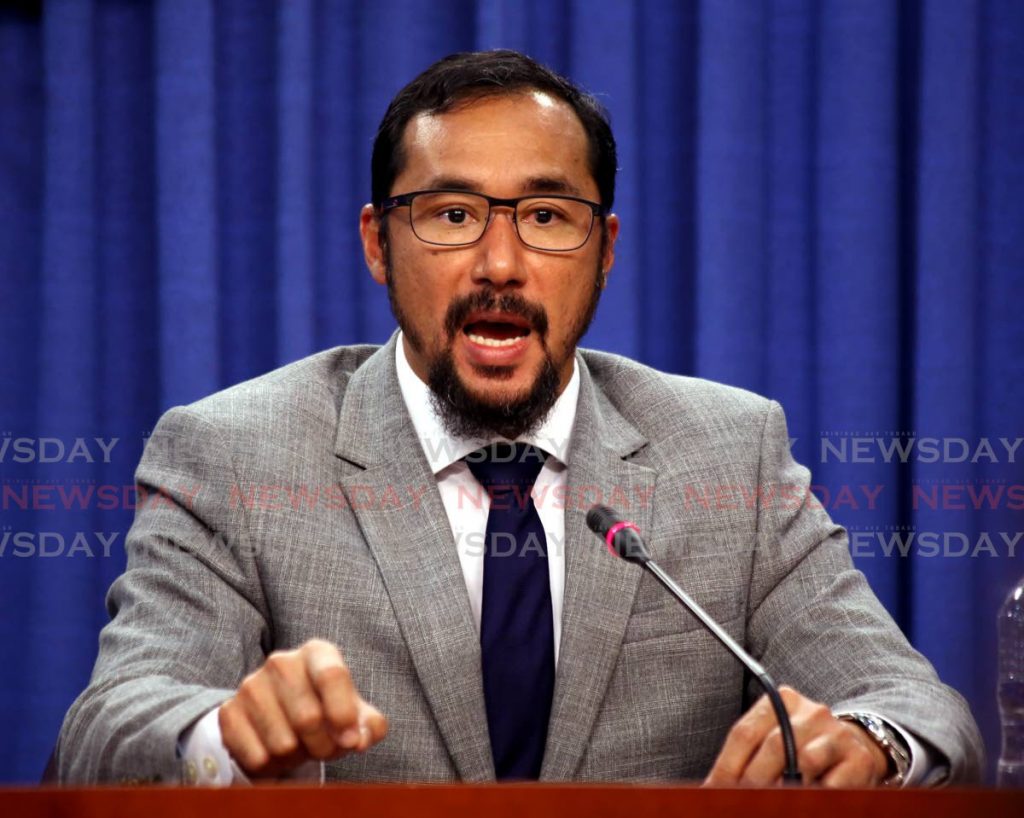Hackshaw did not order Express search

ACTING Police Commissioner Irwin Hackshaw did not instruct his junior officers to search Express House on Wednesday, three days after the media house published an article alleging that he received funds that was flagged as suspicious by the Financial Intelligence Unit (FIU).
Responding to urgent questions by the Opposition in Senate, National Security Minister Stuart Young said he spoke with officers and was assured that the instructions to search the media house was not handed down by Hackshaw. He added that there was ongoing litigation as a result of the matter and he would not speak more on it.
Asked if he received a report on the search by Opposition Senator Wade Mark, Young said: “I was not given a report, I was told by officers in the investigation who confirmed that there was an investigation. I told them to be cautious regarding the media as it pertains to the freedom of the press.”
Young added: “The Police Service is an independent body and the actions respect to investigation are independent and in this particular instance the Government, particularly I as Minister of National Security have no information prior. I was not given any information before the search of the Trinidad Express offices took place.”
He said he was informed that the search was part of an ongoing matter and he did not push further. Mark attempted to ask if Young made any correlation between the search and Hackshaw being acting Police Commissioner but was denied by Senate President Christine Kangaloo.
Newsday contacted Hackshaw who said he was not going to speak on the issue.
Seven officers led by FIB head Supt Wendell Lucas searched the office of Express editor-in-chief Omatie Lyder looking for, according to sources inside the media house, “the source of the information.”
The officers had obtained a warrant from the Port of Spain Magistrates’ Court just after 4 pm and visited the media house shortly after.
They spent two hours there and left empty handed saying it was a “police operation.”
Senior officers told Newsday that the search was not an attack on the media but part of an active investigation into the questionable banking transactions of Hackshaw. The officer who would have leaked the information, if caught faces a three-year jail term or a $250,000 fine.
On Sunday, the Express published an article saying that Hackshaw was being probed by police in relation to suspicious banking transactions. Griffith said he received a file from the Financial Intelligence Unit (FIU) about the alleged misconduct and gave it to the Professional Standards Bureau. Usually, files of such nature are given to the Anti-Corruption Investigations Bureau (ACIB) and the Financial Intelligence Bureau (FIB), but Griffith said he opted to give it to the PSB. Subsequently, the information was leaked to Express. Police seized flash drives from Lyder's office.
Police were stopped from further searching the network servers of Trinidad Express after High Court Judge Kevin Ramcharan granted the media house an injunction pending a court hearing.
Attorneys Sophia Chote, SC and Peter Carter, representing the media house filed the injunction ex-parte and was granted it around 12.30 am on Thursday. After obtaining two warrants, the officers attempted to search and seized the network servers but were stopped after Carter informed the officers that the warrant did not cover that. Ramcharan gave the attorneys up to March 16 to file their full claim.
The search was condemned by the Media Association of TT (MATT), the TT Publishers and Broadcasters Association (TTBPA) The Inter American Press Association (IAPA) and the University of the West Indies Faculty of Law, who all issued individual media releases on Thursday.
Professor Rose-Marie Belle-Antoine, dean of UWI's Faculty of Law, said the search was an "extraordinary and alarming act" which must concern every citizen. She added that press freedom is a fundamental pillar of any democracy and law enforcement "have a duty to avoid actions that can have a chilling effect on that freedom."
MATT's release said the search was an "undisguised, frontal attack on the Constitution of the Republic of Trinidad and Tobago, that guarantees free speech and press freedom."
President of the IAPA, Christopher Barnes and president of the Committee on Freedom of the Press and Information, Roberto Rock, said the action by the police "is nothing short of intimidation and must be condemned as a serious threat to the freedom of the press."
Both men called on the police to "desist from this course and return any material taken away from the newspaper offices, and to respect the role of the press in a democracy and the right of the people to know."


Comments
"Hackshaw did not order Express search"